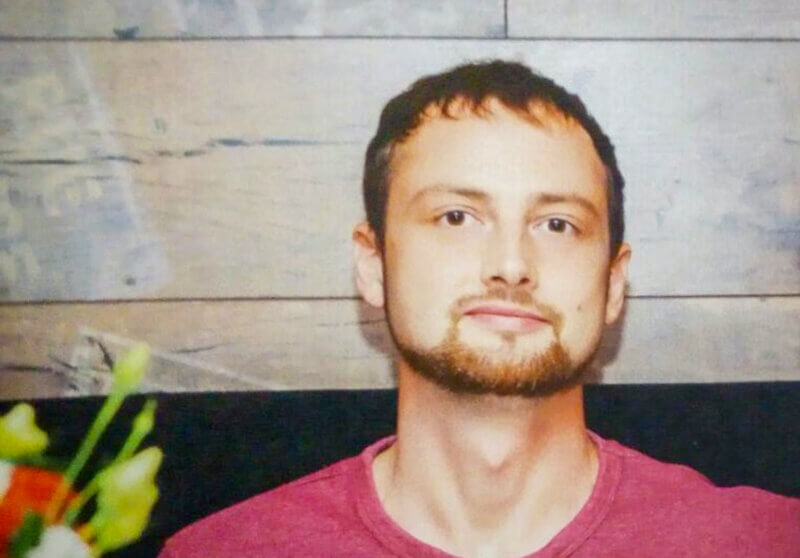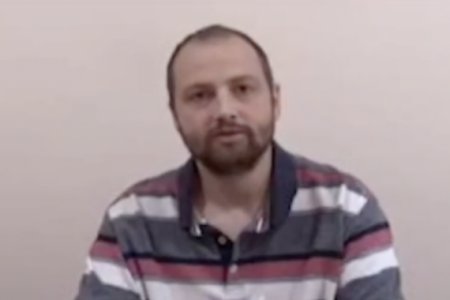
Russia’s military court of appeal in Vlasikha (Moscow region) has upheld the 14-year sentence passed against Yaroslav Zhuk, a Ukrainian abducted by the Russian invaders of his native Melitopol in June 2022 and accused of ‘international terrorism’. ‘Judge’ Maksym Aleksandrovich Panin paid no heed to the circumstances of Zhuk’s abduction; the surreal nature of the charges and Zhuk’s consistent and harrowing account of the torture to which he was subjected. In fact, judging by the apparent lack of any hearings, it is possible that Panin did not bother to even imitate an examination of the material before rubberstamping the original verdict and sentence.
Two volunteers – 32-year-old Yaroslav Zhuk and Ilya Yenin (22) – were abducted from occupied Melitopol (Zaporizhzhia oblast) on 17 June 2022. Yenin was later released, Zhuk, who is married with a small son, simply disappeared.
On 12 July 2022, the Russian state-controlled TASS agency reported Zhuk’s arrest, referring to him as “a saboteur” who had purportedly tried to killed the Russian-installed ‘director of the Melitopol department of education’ Olena Shapurova. As its source TASS cited Volodymyr Rogov, another collaborator, like Shapurova, installed in Russia’s illegal occupation ‘administration’.
Together with a ‘report’ of Orwellian dishonesty, Rogov posted a video on Telegram channel, in which Zhuk, was seen alone, supposedly ‘confessing’ to the attack, and saying that he was part of the partisan movement, under the command of Ukraine’s Security Service [SBU].
It was only in November 2022, that Zhuk, who was by then held prisoner in occupied Crimea, managed to smuggle out a statement, made public by the Crimean Human Rights Group. In this, Zhuk explained that armed men in a BMW had blocked his car on 17 June as he was driving in Melitopol. They had beaten him and dragged him away, taking him with a bag over his head to a basement where he was held for around a week. He could not be specific about the period of time as he kept losing consciousness because of the torture to which he was subjected.
He explained that he had been held all the time with a bag over his head, tied around with scotch tape. For the first three days, he was in handcuffs all the time, then they cut these off with an angle-grinder. Approximately every half-hour, his captors came and tortured him, applying wires to his legs; arms; genitals; earlobes or testicles, with the Russians then turning on an electric current, with this causing agonizing pain. He was also beaten with a blunt instrument over his entire body. They burned his feet with a lit gas burner , and also applied psychological torture. He was not given any food at all during the first week, only a tiny amount of water each day. He wrote that since the torture, he had lost all feeling in his toes, and had partially lost his hearing from the regular beatings around the head.
Unable to endure the torture, he agreed to provide the ‘confessions’ demanded of him. At that point he was taken, blindfolded, to another premises, without any light or water, where “they got me to sign a printed confession to fabricated charges”. There were, in fact, three distinct versions of the ‘confession’, each of which he was tortured into signing. He was then forced to learn the text of (one) ‘confession’ and read it out before a video camera. They waited for this, however, until the torture marks on his face had cleared.
All of the above forms of torture and methods for extracting ‘confessions’ have been mentioned in accounts given by numerous Ukrainian political prisoners since 2014, and by other civilian hostages and prisoners of war seized after Russia’s full-scale invasion of Ukraine. The fabrication of DNA and fingerprint ‘evidence’ through forcing Zhuk to hold various items and substances has also been seen in many other politically motivated cases in occupied Crimea.
Zhuk became one of the first Ukrainian civilians abducted from occupied parts of Kherson or Zaporizhzhia oblasts whom Russia accused of ‘acts of international terrorism’. This is under Article 361 of Russia’s criminal code which had not been used prior to Russia’s full-scale invasion of Ukraine and which Russia appears to be using to try to give some kind of cosmetic gloss to its internationally condemned invasion of Ukraine and seizure of civilians as hostages. It is also preposterous to claim that an attack on a collaborator, like Shapurova, who is helping the invading army, constitutes ‘international terrorism.
Zhuk retracted the supposed ‘confession’ as soon as he received access to an independent lawyer – Alexei Ladin, who has himself been persecuted for his tireless defence of Ukrainian political prisoner. His account of the torture methods used was, typically, ignored by the ‘judges’ from Russia’s notorious Southern District Military Court in Rostov. The latter also paid no heed to the fact that one of the individuals who appeared as a ‘witness’ during the trial, Yury Lysenko, was one of the men who tortured him after his abduction. Nor was the court concerned by the evident absurdity of the story given both by Lysenko and by the other prosecution ‘witness’ – Shapurova.
The Russian prosecutors in this ‘trial’ - Sergei Vladimirovich Aidinov and Vladimir Viacheslavovich Kuznetsov – who demanded an incredible 27-year sentence against Zhuk, have been implicated in ensuring massive sentences without any crime against many Crimean Tatar or other Ukrainian political prisoners. The same is true of presiding ‘judge’ Oleg Aleksandrovich Cherepov who, together with two colleagues, passed the essentially predetermined ‘guilty’ verdict on 25 June 2024. Zhuk was sentenced to 14 years’ maximum-security imprisonment, with the first four years in a prison, the harshest of Russia’s penal institutions.
An address for writing to Yaroslav will be provided as soon as it becomes available. In the meantime, please help by publicizing his persecution. This is what Russia’s invasion and occupation of Ukrainian territory has brought, with the number of such civilian hostages increasing all the time.


